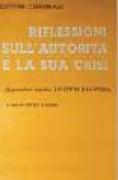Riflessioni sull'autorità e la sua crisi

Published in 1921, the text comes from the need to understand from a philosophical point of view the political crisis that European society lives after the First World War.
In the light of the teaching of Vico, the authority is to Capograssi the moment when the human world takes shape, the principle which gives consistency to the action of the individual and legitimacy to the State. The authority acts as a beginning of unification only if it is the result of free and spontaneous individuals and social forces: it differs from the system of constraints derived from the power of the State. Its main objective is to make each one equal to himself: thus consists in putting each one in the position to be fully human. In this sense, the authority must do justice, giving to each one his own. So that the traditional alternative between authority and equality, as well as between authority and freedom, disappears.
In 1921 Capograssi announces that the dark evil of modern society is the new tyranny, the State as fact, the State as force, the authoritarian State, which is in fact a denial of authority. The analysis of the genesis and essence of totalitarianism, that of human situations, economic, social and ethical positions combined to give to the crisis a totalitarian solution, that will tragically take possession of Europe, make this an extraordinarily lucid and prophetic text. Its outcomes are crucial to understand without distorting the articulation of authority and freedom, of authority and equality, and to address rigorously the concept of crisis.
Author
Giuseppe Capograssi
Disciplina
Publishing House
Year of Publication
1921
Translations
Translated in:
French
From:
With the title:
Réflexions sur l'autorité et sa crise
Editori associati (tassonomia)